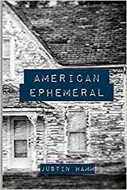 Justin Hamm
Justin Hamm
American Ephemeral
Kelsay Books/Aldrich Press
Reviewer: Francine Witte
If you didn’t take the often-desired road trip through the America’s heartland this past summer, fear not. Justin Hamm’s second book, American Ephemeral, is a beautiful swirl of poetry and photos that just might make you feel as if you are barreling down a highway in the Midwest, stopping here and there to take a closer look at the sights. If you did take the road trip, he will show you some corners that you will surely have missed.
The collection is published by Kelsay Books and opens with a poignant poem that sets the tone. “Worried Playground Daddy’s Blue” shows a father watching his daughter dangling upside down on a tall slide.
Enough of that, I say, I don’t want you
to hurt yourself. Trying to sound composed
when what I mean is I love you please
don’t die on me the way my mother did…
We immediately see the level of emotional engagement we are in for. Later in this poem, he places us firmly in the geography:
Something about Missouri in November,
the trees so recently vacant of leaves…
and:
…can remember how Mom let us roam freely
the trailer park and the thick woods,
how we skipped alongside passing Amtraks…
It is this close attention to detail that places us right where the poet wants us to be. And that place includes locales such as “corn and cow farms,” the inside of “an old rustbucket flatbed,” the parking lot of the “buy everything” supermarket where tax refund day is a kind of national holiday.
Rapid Refund
…the wide-eyed angel child, the one all the teachers pity and call princess poverty, her tiny face a dream of joy and concentration, her tiny feet pumping furiously those brand-new-bike pedals as if she might pedal herself into some other universe entirely…
We meet other characters, compelling and heartfelt, like the small boy in a little league game.
In Little League Once
after bobbling
a slow bouncer,
I made the mistake
of rolling my eyes
at our coach,
who grabbed my collar
and hissed
his terrible coffee
breath
into my pale face
until I began
to sob and jerk
like a puppet…
And Hamm’s descriptions of the countryside itself are luminous.
Late August
All that summer the trailer park baked beneath the cruelest sun in recent history. A drought year. The slender grass strips serving as backyards yellowed before slowly achieving a pale-brown color, a texture strawlike and crunchy underfoot. Where grass would not grow the dry dirt cracked and ant armies crawled in long black trains up from the jagged gaps, scouting out dropped popsicles, discarded hot dogs, open trash containers.
He then shifts our gaze:
In other driveways shirtless men hunched over the engines of rusted jalopies, barking long curse strings as if to invoke the secret language of automobile resurrection. Their blue, gylphlike tattoos hid in the shade of the car hoods but revealed their mysterious selves when the men stood upright and lit cigarettes and rolled their shoulders and leaned far forward and then far backward to stretch stiff muscles while contemplating the dysfunction hidden within the guts of these machines.
And what would any trip through the heartland be without the farmers?
The Farmers at Their Morning Coffee
Hear what news passes their lips
between the slow, ginger sips
from steaming plastic cups
at the local Hardee’s.
Hear the coded odes
to past courting prowess,
the ballads of Mesozoic-like fish
caught not by pole but old-fashioned
Lincoln-style wrestling…
They tell in hushed voices
of witchwives who watch and hear
from afar the truth of a man’s heart.
Was another pitiful year
for the crops, says one.
Too wet to plant in the spring
and too dry to grow
in the summer, says another…
And now the cold, too, has returned.
They all agree it really is
the deep kind that settles
into earth and old bones alike.
Things are always just a little
bit worse that they were
this time yesterday morning.
Still, it must feel good to be
so old and alive on this frosty morning,
to drink such hot coffee
and perhaps pick over
a rubbery breakfast platter
while curing the literal truth
of its shameful lack of color
here at this table where all the seats
are filled for only God
know how much longer.
But for all the interesting and colorful characters we meet, perhaps the most intriguing character is that one that seems to be the author himself.
First Lesson in Meat, 1984
They crash through
the ratty screen door,
all gunflash and colorful
beer cans.
Five men, blood or in-law,
their patchy-bearded
throats alive
with hunter laughter
and gruff guy chatter.
Up front, my grandfather
Undisputed chief, he holds
the pink thing, the dead
rabbit-flesh thing,
one ear in each of his hands.
These were hands that held me
in my towel after a bath,
comforted me writhing
and screaming at dream demons
in the deepest cricket hours
of the night.
Hands that poured
my milk,
chocolate or white,
and parted my translucent hair,
and tied and delicately retied
my shoelaces after my mother
forbid me Velcro.
This is a compelling portrait of how roughness and tenderness reside, as they often do, in one person.
Hamm’s poems create a very visual landscape, but he does not limit himself to words. Hamm is also an accomplished photographer, and his gorgeous black and white photos are placed thoughtfully throughout. He shows us a lone train slicing the countryside, a barn with a scrabbly tree, and clouds scraping the sky, but my personal favorite is an old-fashioned car parked at a gas station.
So, think of American Ephemeral as a vicarious road trip or a companion to your own, but do read it, enjoy its photos, this gorgeous work of a skilled craftsman and folksy storyteller.

